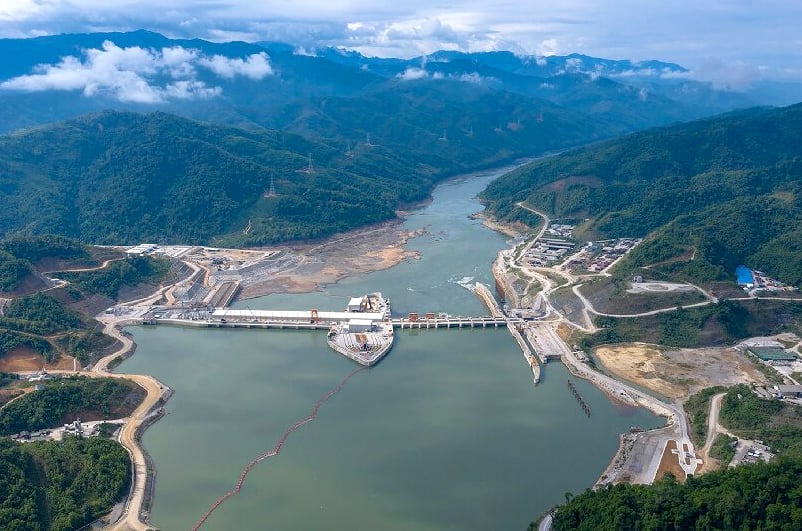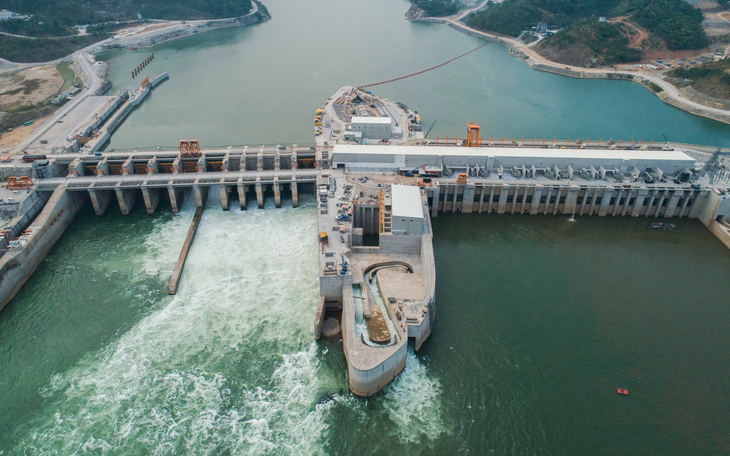June 16, 2025 | 07:07 GMT +7
June 16, 2025 | 07:07 GMT +7
Hotline: 0913.378.918
June 16, 2025 | 07:07 GMT +7
Hotline: 0913.378.918

Xayaburi dam.
According to the Mekong River Commission, Xayaburi dam safety administrators sent a letter to the Ministry of Energy and Mines of Laos announcing the upcoming water release. Continuous torrential rainfall in Laos and water discharges from other upstream hydropower facilities have increased the stream flow to the Xayaburi dam.
The Southern Institute of Irrigation Planning reported that the Xayaburi dam had announced its intention to release water, but the information was vague and lacked specifics regarding the discharge's timing and volume. The Southern Institute of Irrigation Planning has therefore proposed the discharge scenario and the results of the Mekong River's upstream flood transmission.
Accordingly, the current discharge in Chiang Saen is estimated to be approximately 2,100 m3/s. From Chiang Saen to Xayaburi, the catchment area is approximately 103,000 square kilometers. The area has received an average of 15.2 millimeters of precipitation per day over the course of the previous week. The average water discharge generated is 6,200 m3/s. The flow rate through the turbine is 5,000 m3/s, while the flow rate through the spillway is 3,000 m3/s.
Therefore, 8,000 m3/s of water is discharged downstream. The transmission to Kratie is approximately 2,000 m3/s higher when discharged than when it is not. Using a mathematical model to compute flood transmission from Kratie to the upstream of the Mekong River with the above discharge, the average water level rise at Tan Chau is 3.0 centimeters and the maximum is 5.0 centimeters.

Xayaburi Dam from a bird-eye view. Photo: XPCL.
In the past week, inundations in the Mekong River at Tan Chau and Chau Doc have been decreasing and are at a low level. On August 13, the highest daily water level in Tan Chau was 1.99 meters, while the highest daily water level in Chau Doc was 1.79 meters. The water level is expected to rise by an average of 5.0 cm per day over the next five days, in accordance with the high tide trend.
The upstream Mekong River flood is presently at a low level, only slightly higher than the same period in 2019 but lower than the same period in 2015 and significantly lower than the same period in 2022 and the long-term average. The assessment that the impact of the discharge of the Xayaburi dam in Upper Laos, which raises the water level of the Mekong River headwaters in Tan Chau by only 3 to 5 centimeters, is therefore not concerning and deemed insignificant.
Approximately 1,657 kilometers from the Vietnam-Cambodia border, the Xayaburi Dam is the first hydropower facility on the Mekong River's main stem in the lower basin. The construction of the project in Upper Laos began in 2012, was concluded in 2017, and will commence in October 2019.
The dam's design parameters include: The average incoming flow is 3,990 m3/s; the electricity-generating water column is 32,5 m; the turbine flow is 5,000 m3/s; the unit number is 8; the installed capacity is 1,280 MW; the normal water level rise is 275 m; the deceased water level is 270 m; the useful capacity is 225 million m3; and the annual electricity output is 7,406 (GWh).
The Mekong River Commission (MRC) Secretariat reported earlier this month that water levels in the Lower Mekong River Basin (LMB) have risen swiftly and are expected to rise further over the next five days, particularly from Chiang Khan to Khong Chiam in Thailand and Vientiane to Savannakhet in Lao PDR, reported by the ASEAN Post.
According to the MRC's observed water levels and rainfall data, significant rainfall in the Mekong region, which began on 5 August, has contributed to the rise, causing the river levels at the majority of monitoring stations to exceed their long-term averages.
The river level in Vientiane, the capital of Laos, rose by 4.30 meters over the same time period, a rise of roughly 40 percent. The river level is expected to rise between 2.34 m and 3.32 m over the next five days. The increase will place the station level in the alarm state (11.5 m), which is lower than the flood warning threshold of 12.5 m.
Due to tidal effects, the water levels in Tan Chau on the Mekong River and Chau Doc on the Bassac River in Vietnam's Mekong Delta fluctuated and remained below their long-term averages.
Translated by Linh Linh

(VAN) The working delegation from the Ministry of Agriculture and Environment conducted an important trip to the Netherlands to strengthen strategic partnerships and sustainable development in the agricultural sector.

(VAN) The letter ‘A Plea from the Ocean’ not only evokes emotion but also awakens the human conscience to the responsibility of protecting life on Earth.

(VAN) The Department of Agriculture in South Africa has announced the country’s first mass vaccination of poultry to prevent local birds from contracting avian influenza.

(VAN) Establishment of the Mekong Delta Regional Agricultural Linkage Center, aiming for a closed value chain, deep processing, trading platforms, and international market connectivity.

(VAN) Gia Lai province has recently recorded 460 rare species of animals and plants, contributing to forest conservation and biodiversity planning in the region.

(VAN) Ms. Caroline Beresford, New Zealand Ambassador to Vietnam, expressed confidence that agricultural cooperation between Vietnam and New Zealand will develop sustainably, be climate-resilient, and promote gender equality.

(VAN) Vietnam reaffirms its commitment to international cooperation in fostering sustainable and responsible fisheries while ensuring resilient livelihoods for small-scale fishing communities.